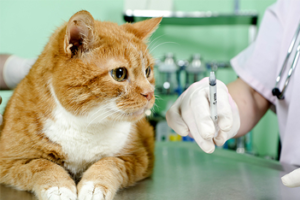Vaccinations

Vaccinations are designed to protect your loved pets against common and often fatal diseases.
Just like humans vaccines work by stimulating an immune response that will protect your cat or dog if it is subsequently exposed to the disease.
For your pet’s safety, we recommend the following vaccination programs:
DOGS
Recommended Vaccination Schedule
6-8 weeks C3 (Distemper / Hepatitis / Parvovirus)
10-12 weeks C5 (C3 + Bortadella Bronchiseptica + Parainfluenza)
14-16 weeks C5
Yearly Booster C5
Distemper
A viral disease that is causing initial vomiting, diarrhea, depression along with coughing, and nasal discharges. It is frequently progressing to severe Central Nervous System problems (convulsions, etc.) Usually fatal or left with long term nervous system problems.
Hepatitis
Viral infection of the liver causing vomiting, diarrhea, jaundice, depression. Mostly fatal.
Parvovirus
Severe viral infection causing vomiting and diarrhea with blood, depression, can be fatal within 12 hours in young pups, highly contagious and is the most common of the fatal diseases we vaccinate against.
Kennel Cough (KC)
Most frequently caused by a combination of virus Parainfluenza and Bortadella bronchiseptica. Symptoms include a harsh dry hacking cough and can lead to secondary lung problems. Highly contagious and especially important in boarding kennels etc.
Non-core vaccines
These vaccines are recommended to those dogs living in areas where there is a higher chance of coming into contact with these diseases.
Leptospirosis (Leptospira icterhaemorrhagiae)
Leptospirosis is a bacterial disease that affects many species of animals as well as human beings. Dogs become infected with leptospira through contact with urine of infected animals. The first signs of disease are fever and depression. Joint pain and excessive bleeding sometimes occurs.
Corona Virus
Canine Corona Virus ties with Canine Parvovirus as the leading causes of severe diarrhea in puppies. Clinically, the two infections can be indistinguishable. In retrospect, Canine Corona Virus rarely kills the puppy while Canine Parvovirus often does.
CATS
6-8 weeks F3 (Feline Infectious Enteritis / Rhinotracheitis / Calicivirus)
11-13 weeks F5 (F3 + Feline Leukaemia Virus and Chlamydia )
16-17 weeks F5 (or F3)
Yearly F5
Feline Infectious Enteritis
Severe viral infection causing vomiting, diarrhea, depression and death in a short period of time
Feline Rhinotracheitis and Feline Calicivirus
Common causes of Cat ‘Flu’. Both viral and results in blocked or discharging nose, sore throat, mouth ulcers, runny eyes, secondary pneumonia. Highly contagious and at times fatal. Some cats will develop a carrier status and remain infective to other cats. The disease can also result in chronic sinus infections.
Feline Leukaemia Virus
Can cause a range of symptoms : bleeding problems, cancers, leukaemia to destruction of blood forming tissue. Tends to be a long term infection causing problems after moths or years of being infected.
Chlamydia
Also causes Cat Flu signs especially conjunctivitis.
RABBITS
Bi-annual vaccination against the fatal Rabbit Calicivirus is recommended from 8 weeks of age.
Calicivirus was released to control wild rabbit population and has been only moderately successful in doing so. However it does occur in pet rabbits and can cause sudden death with little or no other symptoms.

